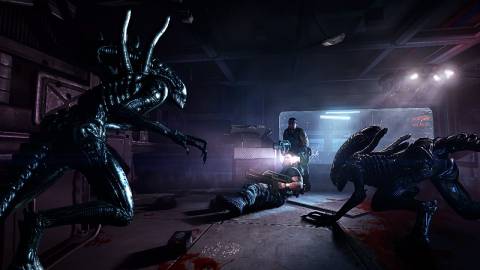"Where did Gearbox go wrong?"

This has been the prevailing question of the week. As many undoubtedly already are aware, Aliens: Colonial Marines, Gearbox's long-delayed homage to all things Alien, released this week to reviews that largely ranged from tepid to outright savagery, including one from yours truly. The occasional baffling outlier not withstanding, people hated Aliens: Colonial Marines, and they did so with good reason.
Despite having purportedly been in at least pre-production stages all the way back in 2006, Colonial Marines is a staggering mess of a game. In rare moments, you can see a glimmer of a good Aliens game, one built on tension, dread, and the overwhelming sense of impending doom every character in the film series has felt since 1979. But those moments are fleeting, too often caked in dingy visuals, broken artificial intelligence, and plotting that recalls some of the dumbest Alien fan fiction one might find when stumbling into a particularly dark and nerdy corner of the Internet. It's the worst, and when games this big are this bad, the immediate reaction is to try to understand how and why this came to be.
Answers, interestingly enough, have seemingly come fast and furious since the game's launch. Granted, much of the talking has been done via anonymity. The juiciest tidbits came by way of this reddit posting from an alleged Gearbox employee. His story was a fascinating one, telling of numerous starts and stops, content dumps, as well as wholesale outsourcing of the game's abysmal single-player campaign to Houston developer TimeGate Studios. His claims echo those of another alleged former Gearbox staffer, dug up by noted video game internet sleuth Superannuation. That poster offered up back in late 2012 a warning regarding the game's development that proved prophetic.
A TimeGate employee (again, anonymously) did reply to that first reddit posting claiming that all of the game's oversight snafus were expressly under the purview of Gearbox. Thus far, however, that's the closest we've come to a proper refutation of the current rumors. Sega as an entity has yet to respond to any of this, though one Sega producer did deny the notion that any major chunks of the game had been outsourced. As for Gearbox, its only acknowledgment of any of this came from studio head Randy Pitchford. He told IGN shortly before release that TimeGate's contribution amounted to maybe 25% of the total game, while also citing other outside collaborators like Demiurge, who worked on the game's network code and is (or had been) reportedly working on the Wii U version. I suppose you could also count Pitchford's recent tweeting regarding people's assertions that Gearbox may have willfully deceived people when making promises it couldn't, or wouldn't, keep.
While no side of the story is likely to be completely accurate, the combination of statements from all sides paints at least a somewhat clear picture of a game badly mishandled. It shows a game announced too early, started and stopped too often, and finished too late. Unfortunately, it also paints a rather ugly picture of Gearbox itself, a studio that definitely spent a lot of time talking up the love and reverence it had for the source material, and allegedly a considerable amount more time putting the project off in favor of others.
In the time since Aliens: Colonial Marines was announced, Gearbox has released two games in the very successful Borderlands franchise, as well as the misguided rescue project that was Duke Nukem Forever. In between all of that, varying numbers of Gearbox staffers and other outsourcing studios were presumably plugging away at inconsistent intervals on Aliens, a game that had been talked up at no less than four E3s, several PAXes, and god only knows how many other various press events. For a game that seemed to be a long way off from completion, it sure did spend a lot of time promoting it.

I sat in on at least four separate Aliens demos over the years. In no less than three of them, I watched as Pitchford introduced us to what was supposed to be his team's game by explaining in bountiful detail about how much he, and those around him at Gearbox, loved Aliens. To hear him tell it, it was akin to a childhood dream being realized when the project became his. He giddily told of the time he was able to meet with Ridley Scott in his office, and Ridley did him the pleasure of showing him his many saved concept art sketches from the original film. The first time I heard that story, I was enraptured. The second time, still interested. By the third, I was starting to wonder if that meeting had been the only truly fruitful moment of that game's development.
I say that because each time I watched Aliens being demoed, I saw the same basic chunks of footage. Early scenes in the game set aboard the Sulaco and another colonial marine ship were played out in front of me with only small variances each time. Sure, they were different level sections, but the key jumps, scares, and moments of cinematic drama were all pretty much the same thing. It all looked very polished; maybe too polished, really.
This seems to be the biggest sticking point people have with Aliens. Namely, the notion that what Gearbox demoed over the years didn't come close to lining up with the finished product. Scenes that moved with a smooth efficiency in the demos were haggard messes in reality, filled with glitchy enemies and visuals that looked like they hadn't been updated since the game's initial development cycle. Any number of YouTube videos have documented this with ample bluntness, though on some level, I can't help but wonder if we should even be surprised by this.
After all, it's not as if unrealistic tech demonstrations haven't become the de rigeur method of early promotion during this generation. I don't imagine I need to take you all back to 2005, when Sony unveiled the PlayStation 3, and along with it, the now infamous Killzone 2 tech demo that proved, well, perhaps somewhat dubious in comparison with the product that made it to shelves. For a more recent example, one need only look to BioShock Infinite. That demo that took every E3 award in 2011 was a masterwork of pacing, action, and tension, a sequence of events so seemingly effortless in its flow, that of course it proved to be anything but. As numerous previewers have noted since actually sitting down to play the BioShock Infinite demo late last year--and I will do in my own write-up of the game later this week--that sequence no longer quite resembles itself in the final game. The action is more mechanical, not as pristinely paced as we saw when it was shown to us just a year and a half prior. In its place was a segment of gameplay that was still breathtaking and exciting, but in a way that felt much more traditional to the mechanics of gameplay we generally know and understand, versus something overtly revolutionary.
In this regard, BioShock is perhaps the best case scenario for such marketing tactics, and Aliens is perhaps the worst. BioShock at least still looked tremendously good, and still played like a game that had been the sole focus of its developers for quite some time. Aliens, on the other hand, played like cast-off licensed junk, the worst kind of cynical cash-in that Randy Pitchford had spent years swearing up and down he'd been actively working to avoid when making his stamp on the Aliens franchise. In effect, Gearbox made literally the opposite game that it had intended to. I don't know if I can recall many instances of that happening in the 25 years or so that I have been playing and following video games.
Someone, I expect, will write a very fascinating long-form feature about Aliens' protracted and tragic development history. This will, of course, be years from now, long past the sting of the biting criticism and social media mockery of this week, and whatever worst-of lists Colonial Marines is sure to make come this holiday season. It will come when Gearbox has gone comfortably past the point of having to worry about Aliens and those who despised it. And that time will come. After all, Borderlands continues to be a major cash cow for the studio, and should spawn many more sequels over the course of the next generation. Plus, it's not as though the team is devoid of talent. Its Brothers in Arms series has, when active, been generally praised by the media and players alike, and while Duke Nukem makes for a particularly ugly blemish on its record, Gearbox can at least pretend it just finished someone else's mess, as opposed to making one themselves.
This blemish is solely the property of Gearbox and its direct collaborators. Aliens' disastrous launch and subsequent response is directly the result of the words said and the images shown by Gearbox, which proved to be anything but accurate. The game industry has a short memory for average failures, but the big ones? The ones that really resonate? They never go away. They cling to your name and your brand in a way that might not always be totally fair or appropriate, but nonetheless tends to smother out whatever else it is you might be looking to promote. Randy Pitchford is going to get a lot of Aliens questions over the next year or so, and rightfully so. How he handles those questions, and frankly how he and his team choose to promote their products from here on out will go a long way toward determining how people view them in the long-run. People are going to scrutinize every demo Gearbox delivers, every trailer it chooses to put out, every statement made about their future games looking for discrepancies, embellishments, or outright bullshit. Put out a bunch of great games, and people will generally take you at your word. Make a bunch of big promises and fail to deliver on them? It only takes one of those situations for your credibility to fly right out the window.
I'm still a fan of Gearbox and what it does, and I still look forward to whatever it has cooked up next. I guess all I'm saying is that now, whatever that turns out to be, I'll be a bit more careful when considering the things it tells me about it. No matter how cool what it shows next may be, Aliens will be sitting there in the back of my mind, reminding me that this studio is just as capable of dropping the ball as any other.
--A